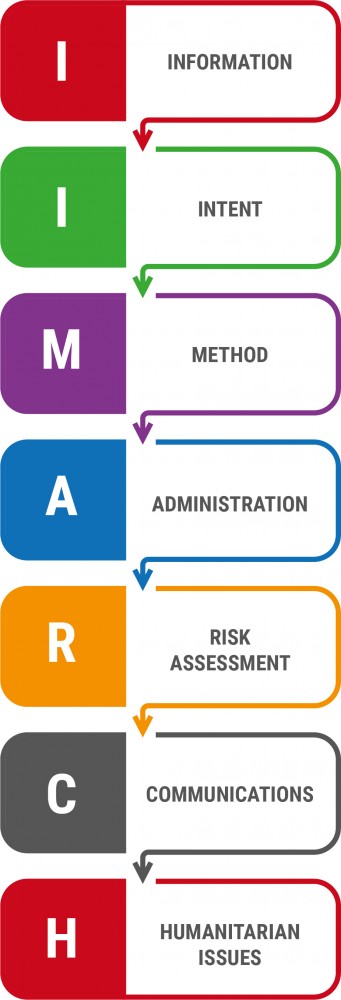Briefing
Briefing IIMARCH
Once commanders have made decisions and decided on actions, information must be relayed in a structured way that can be easily understood by those who will carry out actions or support activities. This is commonly known as briefing. Using IIMARCH headings as a guide, a brief can be prepared in appropriate detail.
IIMARCH (Information, Intent, Method, Administration, Risk Assessment, Communications and Humanitarian Issues) is not the only structured briefing format available. However, it is widely used by emergency responders.
When using IIMARCH to prepare a briefing it is helpful to consider the following:
- Brevity is important – if it is not relevant, leave it out
- Communicate using unambiguous language free from jargon and in terms people will understand
- Check that others understand and explain if necessary
- Consider whether an agreed information assessment tool or framework has been used
To download an example IIMARCH template click here.
When using IIMARCH the following should be considered:
| Element | Key questions | Considerations |
|---|---|---|
| INFORMATION | What, where, when, how?So what?What might?How many? | Timeline and history (if applicable)Key facts reported using M/ETHANE:Major Incident (declared or not?) Exact Location Type of Incident Hazards Access Number of casualties Emergency services |
| INTENT | Why are we here?What are we trying to achieve? | Strategic aim and objectivesJoint working strategy |
| METHOD | How are we going to do it? | Command, control and coordination arrangementsTactical and operational policy and plansContingency plans |
| ADMINISTRATION | What is required for effective, efficient and safe implementation? | Identification of commandersTaskingTimingDecision logsEquipmentDress code & PPEWelfare, food and logistics |
| RISK ASSESSMENT | What are the relevant risks?What measures are required to mitigate them? | To reflect the JESIP principle – joint understanding of riskUsing the ERICPD hierarchy for risk control as appropriateDecision controls |
| COMMUNICATIONS | How are we going to initiate and maintain communications with all partners and interested parties? | Radio Call signsOther means of communicationUnderstanding of interagency communicationsInformation assessmentDealing with the media, develop a joint media strategy and plan |
| HUMANITARIAN ISSUES | What humanitarian assistance and human rights issues arise or may arise from this event and the response to it? | Requirement for humanitarian assistanceInformation sharing and disclosurePotential impacts on individuals’ human rights |

